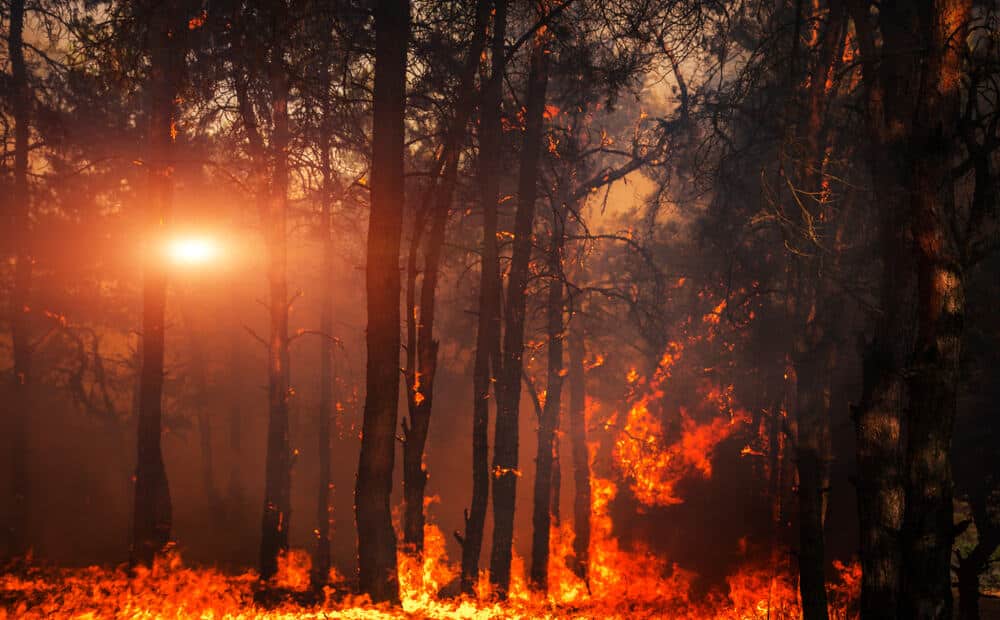Smoke from a massive wildfire in the Highlands, which has injured two firefighters and burned more than three square miles, is visible from space. The fire at Cannich, located in the hills above Loch Ness, has entered its fourth day, with four fire engines and specialist resources still on the scene.
Satellite images from NASA depict the plume of smoke from the blaze drifting towards the loch on Monday amid clear skies. Helicopters are being utilized to waterbomb the area, and the public has been warned against walking their dogs in the vicinity as a safety precaution.
The two firefighters who sustained injuries in an all-terrain vehicle accident have been released from the hospital after being airlifted from the scene on Tuesday morning. The Scottish Fire and Rescue Service (SFRS) stated that an investigation into the incident is ongoing, as reported by The Independent.
The current fire was first reported at 12.46 pm on Sunday. At its peak, a helicopter was employed to waterbomb the area, and nine appliances were dispatched to the scene. The fire now spans approximately 3.08 square miles. This marks the fourth time firefighters have attended fires in the same area since May 23.
Meanwhile, the SFRS has extended a wildfire warning across much of Scotland until Monday. The warning, in effect since May 26, categorizes the risk of wildfires as “very high” in most of east, central, and southern Scotland.
“As the warm and dry weather continues, the risk of wildfire also increases. The ongoing incident at Cannich shows just how large these fires can become. A mixture of seasonal weather conditions combined with very dry and dead vegetation means there is a heightened risk of fires, which can be started by the careless disposal of cigarettes as well as barbecues or campfires left unattended,” SFRS Group Commander Niall MacLennan said.
“Many of our rural and remote communities are hugely impacted by these incidents, which can cause significant environmental and economic damage. Cannich has been a challenging incident, and our crews are working tirelessly to tackle the fire and stop further spread. Extinguishing a fire on this scale requires a large amount of resources, including the use of helicopters to bolster our response. We will remain on scene until we make the area safe,” he added.
“Our thoughts are with the firefighters who have been injured tackling the wildfire in the area around Cannich. Nearly 3,000 hectares of land have already been burned in this fire, following the massive wildfire near Glenuig in April, which was estimated to be the second largest in UK history. Wildfires have a devastating impact on wildlife and habitats, generating catastrophic carbon emissions. They are becoming increasingly frequent in Scotland, partly due to climate change and partly due to a lack of fuel load management in some areas,” Ross Ewing, Scottish Land & Estates Director of Moorland, said.
“This wildfire demonstrates how important it is to utilize all the tools at our disposal to manage the fuel load of vegetation, which has been shown to increase wildfire risk. We hope the situation at Cannich will soon be contained so that the scale and extent of damage can be assessed. We urge anyone going out into the countryside to take care and follow guidance in relation to campfire cooking and when the ground is so dry it’s recommended not to use either a campfire or a camping stove,” Ewing continued.
In light of the increasing frequency and severity of wildfires, the outdoor recreation industry should prioritize educating campers, hikers, and other outdoor enthusiasts on responsible behavior to minimize the risk of igniting such fires.
This includes providing clear guidelines and resources on fire safety, responsible campfire management, and the proper disposal of cigarettes and other waste materials. Additionally, campgrounds and parks can collaborate with local fire departments to establish fire prevention and response plans, ensuring a swift and effective response to any potential wildfire incidents.
By promoting a culture of responsibility and awareness among outdoor adventurers, the outdoor recreation industry can help to better protect the environment, wildlife, and the communities that rely on these natural spaces for their livelihoods.


